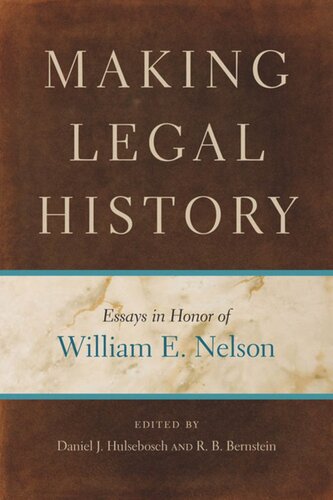

Most ebook files are in PDF format, so you can easily read them using various software such as Foxit Reader or directly on the Google Chrome browser.
Some ebook files are released by publishers in other formats such as .awz, .mobi, .epub, .fb2, etc. You may need to install specific software to read these formats on mobile/PC, such as Calibre.
Please read the tutorial at this link: https://ebookbell.com/faq
We offer FREE conversion to the popular formats you request; however, this may take some time. Therefore, right after payment, please email us, and we will try to provide the service as quickly as possible.
For some exceptional file formats or broken links (if any), please refrain from opening any disputes. Instead, email us first, and we will try to assist within a maximum of 6 hours.
EbookBell Team

5.0
98 reviewsOne of the academy’s leading legal historians, William E. Nelson is the Edward Weinfeld Professor of Law at New York University School of Law. For more than four decades, Nelson has produced some of the most original and creative work on American constitutional and legal history. His prize-winning books have blazed new trails for historians with their substantive arguments and the scope and depth of Nelson’s exploration of primary sources. Nelson was the first legal scholar to use early American county court records as sources of legal and social history, and his work (on legal history in England, colonial America, and New York) has been a model for generations of legal historians.
This book collects ten essays exemplifying and explaining the process of identifying and interpreting archival sources—the foundation of an array of methods of writing American legal history. The essays presented here span the full range of American history from the colonial era to the 1980s.Each historian has either identified a body of sources not previously explored or devised a new method of interrogating sources already known.The result is a kaleidoscopic examination of the historian’s task and of the research methods and interpretative strategies that characterize the rich, complex field of American constitutional and legal history.